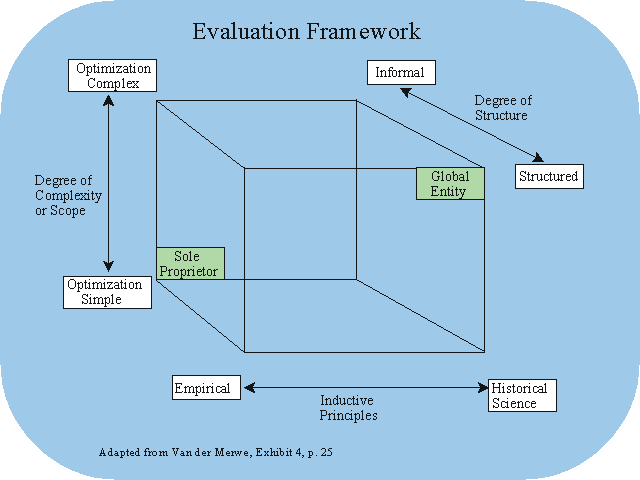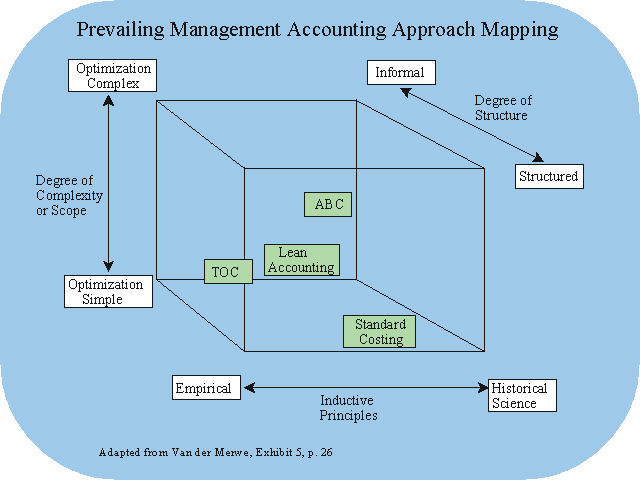
Summary by James R. Martin, Ph.D., CMA
Professor Emeritus, University of South Florida
Controversial Issues Main Page |
Cost Management Main Page
In the first paper in this three part series 1 Van der Merwe argues that the current state of management accounting is contradictory, confusing, and often absurd. In the second paper 2 he establishes the principles that serve as the cornerstones for the restoration of management accounting and demonstrates how they are integrated into an existing management accounting framework. The purpose of this paper is to present an evaluation framework to critically evaluate some of the assertions related to the prevailing approaches to management accounting.
Evaluation Framework
There are three dimensions of the evaluation framework. These include:
1. Optimization scope,
2. the underlying inductive principles, and
3. the degree of system structure.
Optimization scope includes the value chain areas involved and the range of decisions needed for optimization. The value chain areas include 1) resource sourcing, 2) the processes involved in the conversion of inputs, 3) converting inputs into outputs, and 4) marketing the outputs. Optimization also includes the depth of decisions that may require throughput costs, incremental costs, attributable costs, and full costs.
The underlying inductive principles of empirical science and inductive science represent the second evaluation dimension. Pure empirical systems are relatively simple systems that require special studies for decisions. On the other hand, comprehensive systems are complex and depend on the underlying historical science principles of causality and analogy. The appropriate mix of inductive principles depends on the complexity of the enterprise. More complex environments require a management accounting system based on historical science.
The third evaluation dimension is the degree of system structure required. This dimension is also related to the complexity of the enterprise.
For example, a sole proprietorship needs only a simple system based on empirical principles, and little structure. On the other extreme, a global entity needs a complex optimization system, based on the historical science principles (causality and analogy), and a formal structure. This evaluation framework is illustrated in the graphic presented below.

Using the Evaluation Framework to Map the Prevailing Approaches to Management Accounting
The framework above can be used to map the prevailing approaches to management accounting as illustrated in the graphic below. ABC is highly structured, but falls on the low side of a historical science system due to its inability to deal adequately with fixed costs. Lean accounting is low on the degree of complexity scale, requires less structure and emphasizes the value stream as the single cost object. The theory of constraints is less structured than lean accounting and less dependent on historical science. TOC also scores low on system optimization because of its focus on throughput. Standard costing is highly structured and based on historical science, but scores low on enterprise optimization.

Fallacies
This section deals mainly with the simple vs. complexity controversy, or the argument that management accounting systems need to be simple. Van der Merwe argues that this viewpoint is based on a number of fallacies. The first of these is referred to as the "reductive fallacy" or the "nothing buttery" fallacy. Examples include the arguments that nothing but throughput optimization is needed, or nothing but optimizing the value stream is needed. Nothing but claims require "more-than" knowledge that advocates never reveal. Another fallacy is referred to as the "diversion fallacy" or the "red herring" fallacy. The "red herring" evades the question and changes the subject. The author also mentions the slippery slope fallacy, i.e., "reject one thing because it will slip into something else", e.g., a comprehensive system will slip into an excessively complex system), and the "loaded question fallacy", e.g., do we really need a complex management accounting system that our shop floor people will not understand?
Conclusion
The concept of relativism (anything goes) has led management accounting to conflicting theories, confusion, contradictions, an inability to adequately communicate either internally or externally, and a lack of any real progress. The way out of this predicament is to embrace the structure outlined in part two of this series of papers. Management accountants cannot merely wait and criticize, they must move forward to produce a better system based on the laws of logic.
_____________________________________________
References:
1 Van der Merwe, A. 2007. Management accounting philosophy I: Gaping holes in our foundation. Cost Management (May/June): 5-11. (Summary).
2 Van der Merwe, A. 2007. Management accounting philosophy II: The cornerstones of restoration. Cost Management (September/October): 26-33. (Summary).
Other related summaries:
Appelbaum, D., A. Kogan and M. A. Vasarhelyi. 2017. An introduction to data analysis for auditors and accountants. The CPA Journal (February): 32-37. (Summary).
Appelbaum, D., A. Kogan, M. Vasarhelyi and Z. Yan. 2017. Impact of business analytics and enterprise systems on managerial accounting. International Journal of Accounting Information Systems (25): 29-44. (Summary).
Birnberg, J. G. 1992. Managerial accounting: Yet another retrospective. Advances in Management Accounting (1): 1-19. (Summary).
Covaleski, M. and M. Aiken. 1986. Accounting theories of organizations: Some preliminary considerations. Accounting, Organizations and Society 11(4-5): 297-319. (Summary).
Flamholtz, E. G. 1992. Relevance regained: Management accounting - Past, present and future. Advances in Management Accounting (1): 21-34. (Summary).
Horngren, C. T. 1989. Cost and management accounting: Yesterday, and today. Journal of Management Accounting Research (1): 21-32. (Summary).
Macy, G. and V. Arunachalam 1995. Management accounting systems and contingency theory: In Search of effective systems. Advances in Management Accounting (4): 63-86. (Summary).
Shillinglaw, G. 1989. Managerial cost accounting: Present and future. Journal of Management Accounting Research (1): 33-46. (Summary).
Tiessen, P. and J. H. Waterhouse. 1983. Towards a descriptive theory of management accounting. Accounting, Organizations and Society 8(2-3): 251-267. (Summary).
White, L. A., A. Van der Merwe, B. D. Clinton, G. Cokins, C. Thomas, K. Templin and J. Huntzinger. 2012. Conceptual Framework for Managerial Costing: Draft Report of the IMA Managerial Costing Conceptual Framework Task Force. IMA. (Summary).